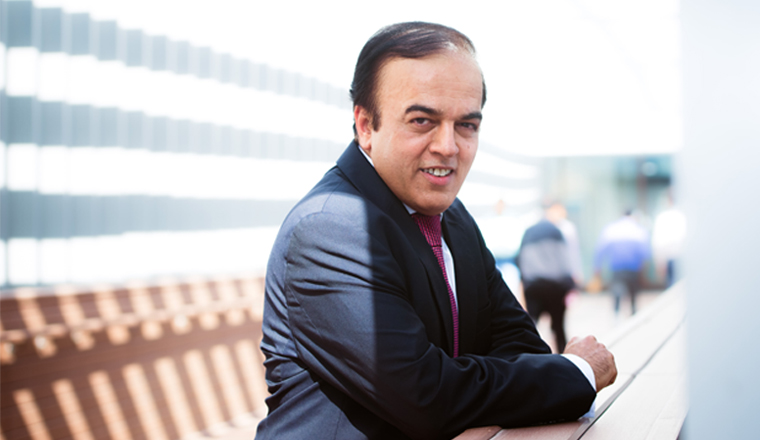Published: February 3, 2015
The managing director of Alpen Capital, which advised India’s Jet Airways on its recent loan from a consortium of Gulf banks, expects a rise in cross-border financing this year.
Since 2005, Dubai-based Alpen Capital has acted as an investment bank and adviser to firms in the Gulf Cooperation Council (GCC). About four years ago, the firm decided to capitalise on growing links between India and the GCC – and the knowledge of its directors, many of whom are from the subcontinent – by reaching out to Indian firms and encouraging them to grow their businesses or raise funds in the Gulf.
The hard work seems to be paying off. In December the firm advised Jet Airways, India’s second-largest carrier, on a US$150mn syndicated loan from a group of local banks, led by Mashreq. Soon after the firm advised Jindal SAW, an Indian manufacturer of pipes, on a US$127mn syndicated loan from a group of GCC banks. Managing director Sanjay Vig spoke with EMEA Finance about the trends these deals illustrate.
How did Alpen Capital get involved with the Jet Airways deal?
We have been covering the Indian market from here [Dubai] and explaining to people what the GCC can give to them for quite some time. Any Indian company that has had an association with the Gulf is a fine target for us. So given that Jet Airways was flying into the region, and has Middle Eastern [revenue] flows, they were on our radar screen.
GCC banks are keen to look at any exporter where they can see the cash at work and see the GCC link – and we explain to Indian companies why they should look at raising capital in the Middle East, in this case debt.
How did you develop this link with the Indian market?
We realised that Indian companies have always relied on overseas capital to grow but have overlooked the Middle East. At the same time, a lot of the global banks that are based here report to London and the operations they have in India report to Singapore, so I don’t think they really established that link. Given the fact that India is a big market for the GCC both in sourcing and supplying, there was a natural linkage – we just tried to bring about that link and make people aware of why they should look at the GCC.
Indians now have the desire to go global and, in addition to raising capital, they’ve been trying to target raw material and upstream assets internationally because there is such big demand at home. We advised them that they should look at the Middle East. Similarly for Indian companies that have historically been exporting to the Middle East, we have advocated the benefit of setting up a manufacturing unit here and supplying to the region from the region.
A good example is the fertiliser industry. India is one of the largest fertiliser markets, but a lot of the key requirements of fertiliser emanate from the MENA region – whether its rock phosphate, ammonia or sulphur. We have been working with Indian fertiliser companies on why they should be promoting themselves and setting up upstream manufacturing units in the Gulf and the larger MENA area.
Is it easy to get Indian companies to look at the GCC as a source of capital?
It’s been an evolving phase. I’m not saying it was a cakewalk - it was originally very difficult. But you just need one good transaction, and once that hits the papers in India other people say ‘why not?’ Soon after Jet Airways, we closed a US$127mn financing for Jindal SAW, an Indian company with a plant in the UAE. Now we are working on debt and equity mandates to the tune of US$2-3bn that we expect to happen over the next 12-15 months in areas like fertilisers, chemicals, downstream petrochemical assets and food. The GCC imports all its food requirements and India is a large producer and exporter.
Given the strength of banks in the Gulf, is there an inclination also to lend to non-GCC-focused Indian companies?
There has to be a business link with the GCC – either they are producing here or they are selling here. From that perspective it becomes easier for the banks to look at their exposure. But for Indian companies with no GCC link, it is going to be a difficult bet unless they are really well known and a global brand. I would not expect Middle Eastern banks to be very keen on such exposure.
Will most of your clients’ fundraising be in the loan market?
That remains our core business. We have done about US$13bn of mandates – about US$10bn has been debt and US$3bn equity. I would suspect this year that debt will remain the prime business for us though happily we are working on some equity mandates, starting in the first quarter, so this year will be a bit more balanced.
Can you see any Indian companies looking to dual list in the UAE during 2015?
I’m aware that some Indian promoters are looking at that – whether it will happen in the next few months is difficult to say. There has to be a market for their stock and right now, given the bullishness of the Indian market, there is no need for Indian companies to be raising equity overseas. But I think it will gradually happen, and you will see Indian companies seeking secondary listings as well as raising capital from the Middle East.


